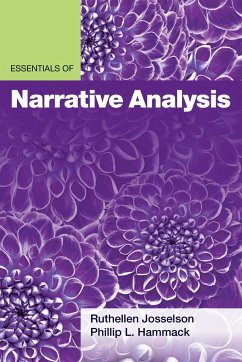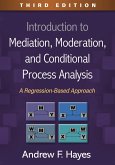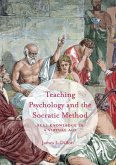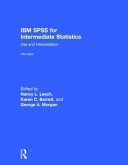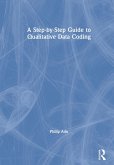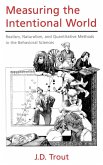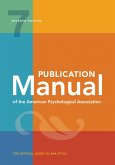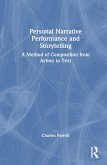- Broschiertes Buch
- Merkliste
- Auf die Merkliste
- Bewerten Bewerten
- Teilen
- Produkt teilen
- Produkterinnerung
- Produkterinnerung
This book introduces readers to narrative analysis, a qualitative method that investigates how people engage in storytelling to make meaning of life’s challenges and opportunities.
Andere Kunden interessierten sich auch für
![Introduction to Mediation, Moderation, and Conditional Process Analysis Introduction to Mediation, Moderation, and Conditional Process Analysis]() Andrew F. HayesIntroduction to Mediation, Moderation, and Conditional Process Analysis67,99 €
Andrew F. HayesIntroduction to Mediation, Moderation, and Conditional Process Analysis67,99 €![Teaching Psychology and the Socratic Method Teaching Psychology and the Socratic Method]() James J. DillonTeaching Psychology and the Socratic Method68,99 €
James J. DillonTeaching Psychology and the Socratic Method68,99 €![IBM SPSS for Intermediate Statistics IBM SPSS for Intermediate Statistics]() Karen C. BarrettIBM SPSS for Intermediate Statistics213,99 €
Karen C. BarrettIBM SPSS for Intermediate Statistics213,99 €![A Step-by-Step Guide to Qualitative Data Coding A Step-by-Step Guide to Qualitative Data Coding]() Philip AduA Step-by-Step Guide to Qualitative Data Coding172,99 €
Philip AduA Step-by-Step Guide to Qualitative Data Coding172,99 €![Measuring the Intentional World Measuring the Intentional World]() J. D. TroutMeasuring the Intentional World186,99 €
J. D. TroutMeasuring the Intentional World186,99 €![Publication Manual (OFFICIAL) Publication Manual (OFFICIAL)]() American PsychoPublication Manual (OFFICIAL)50,99 €
American PsychoPublication Manual (OFFICIAL)50,99 €![Personal Narrative Performance and Storytelling Personal Narrative Performance and Storytelling]() Charles ParrottPersonal Narrative Performance and Storytelling170,99 €
Charles ParrottPersonal Narrative Performance and Storytelling170,99 €-
-
-
This book introduces readers to narrative analysis, a qualitative method that investigates how people engage in storytelling to make meaning of life’s challenges and opportunities.
Produktdetails
- Produktdetails
- Verlag: APA
- Seitenzahl: 102
- Erscheinungstermin: 6. Juli 2021
- Englisch
- Abmessung: 224mm x 148mm x 7mm
- Gewicht: 170g
- ISBN-13: 9781433835674
- ISBN-10: 1433835673
- Artikelnr.: 61994559
- Herstellerkennzeichnung
- Libri GmbH
- Europaallee 1
- 36244 Bad Hersfeld
- gpsr@libri.de
- Verlag: APA
- Seitenzahl: 102
- Erscheinungstermin: 6. Juli 2021
- Englisch
- Abmessung: 224mm x 148mm x 7mm
- Gewicht: 170g
- ISBN-13: 9781433835674
- ISBN-10: 1433835673
- Artikelnr.: 61994559
- Herstellerkennzeichnung
- Libri GmbH
- Europaallee 1
- 36244 Bad Hersfeld
- gpsr@libri.de
Ruthellen Josselson,PhD, is a professor of clinical psychology at Fielding Graduate University, Santa Barbara, California. She was formerly a professor at The Hebrew University of Jerusalem, a visiting professor at Harvard Graduate School of Education, and a visiting fellow at Cambridge University. She is a cofounder of the Society for Qualitative Inquiry in Psychology and editor of the American Psychological Association (APA) journal Qualitative Psychology. She received the Henry A. Murray Award and the Theodore R. Sarbin Award from APA and the Distinguished Contributions to Qualitative Inquiry Award from APA Division 5 (Quantitative and Qualitative Methods). On the basis of interviews she has conducted over 35 years, she has written three books exploring women amp rsquo s identity longitudinally: Finding Herself, Revising Herself, and most recently, Paths to Fulfillment: Women amp rsquo s Search for Meaning and Identity. Many of her other books (The Space Between Us, Best Friends, Playing Pygmalion) are based on interviews, and she has authored many journal articles and book chapters that explore the theory and practice of qualitative inquiry. Recently, she authored Interviewing for Qualitative Inquiry: A Relational Approach. She has conducted workshops on qualitative inquiry in France, Norway, Finland, Israel, and England, as well as in the United States. She was a member of the APA task force that produced the amp ldquo Journal Article Reporting Standards for Qualitative Research. amp rdquo Phillip L. Hammack, PhD, is a professor and chair of psychology and director of the Sexual and Gender Diversity Laboratory at the University of California, Santa Cruz. He was trained as an interdisciplinary social scientist in the Committee on Human Development at the University of Chicago, where he received his doctorate in 2 . Dr. Hammack has been a leader in the movement to promote narrative theory and methods and to legitimize qualitative inquiry in psychology. Among his widely cited work is the 2 8 paper amp ldquo Narrative and the Cultural Psychology of Identity, amp rdquo published in Personality and Social Psychology Review, and the 2 book Narrative and the Politics of Identity, published by Oxford University Press. Dr. Hammack is also editor of The Oxford Handbook of Social Psychology and Social Justice (2 8) and of the Oxford University Press Series on Sexuality, Identity, and Society. He is associate editor of Qualitative Psychology, the official journal of the Society for Qualitative Inquiry in Psychology. Dr. Hammack is the recipient of several early career awards and prestigious fellowships, including a William T. Grant Scholar Award and a fellowship from the Center for Advanced Study in the Behavioral Sciences at Stanford University. His current research focuses on gender, sexual, and intimate diversity, centering the use of narrative and other qualitative methods.
Series Foreword—Clara E. Hill and Sarah Knox
1. Conceptual Foundations for the Method
Stories and Human Experience: The Call for Narrative Analysis
History and Epistemology of Narrative Analysis
Key Features of Narrative Analysis
Summary
2. Study Design and Data Collection
Research Questions
Recruiting, Interviewing, Analyzing: The Recursive Circle
3. Data Analysis
Processes of Analysis
Orientation to the Narrative
A Sample Narrative Analysis: The Story of Lou
Reflexivity and the Analytic Process
4. Writing the Manuscript
Typical Structure of a Journal Article
Representation
Typical Structure of a Book or Dissertation
Tips for Manuscript Preparation
5. Variations on the Method
Small Stories
Variations in Analysis
6. Methodological Integrity and Ethics
Amount and Contextualization of Data Collected
Perspective Management
Data and Research Question
Coherence and Groundedness of Interpretations
Ethics
7. Summary and Conclusions
Benefits and Advantages of Narrative Analysis
Limitations of Narrative Analysis
Narrative Analysis for a New Psychology
Appendix: Exemplar Studies
References
Index
About the Authors
About the Series Editors
1. Conceptual Foundations for the Method
Stories and Human Experience: The Call for Narrative Analysis
History and Epistemology of Narrative Analysis
Key Features of Narrative Analysis
Summary
2. Study Design and Data Collection
Research Questions
Recruiting, Interviewing, Analyzing: The Recursive Circle
3. Data Analysis
Processes of Analysis
Orientation to the Narrative
A Sample Narrative Analysis: The Story of Lou
Reflexivity and the Analytic Process
4. Writing the Manuscript
Typical Structure of a Journal Article
Representation
Typical Structure of a Book or Dissertation
Tips for Manuscript Preparation
5. Variations on the Method
Small Stories
Variations in Analysis
6. Methodological Integrity and Ethics
Amount and Contextualization of Data Collected
Perspective Management
Data and Research Question
Coherence and Groundedness of Interpretations
Ethics
7. Summary and Conclusions
Benefits and Advantages of Narrative Analysis
Limitations of Narrative Analysis
Narrative Analysis for a New Psychology
Appendix: Exemplar Studies
References
Index
About the Authors
About the Series Editors
Series Foreword—Clara E. Hill and Sarah Knox
1. Conceptual Foundations for the Method
Stories and Human Experience: The Call for Narrative Analysis
History and Epistemology of Narrative Analysis
Key Features of Narrative Analysis
Summary
2. Study Design and Data Collection
Research Questions
Recruiting, Interviewing, Analyzing: The Recursive Circle
3. Data Analysis
Processes of Analysis
Orientation to the Narrative
A Sample Narrative Analysis: The Story of Lou
Reflexivity and the Analytic Process
4. Writing the Manuscript
Typical Structure of a Journal Article
Representation
Typical Structure of a Book or Dissertation
Tips for Manuscript Preparation
5. Variations on the Method
Small Stories
Variations in Analysis
6. Methodological Integrity and Ethics
Amount and Contextualization of Data Collected
Perspective Management
Data and Research Question
Coherence and Groundedness of Interpretations
Ethics
7. Summary and Conclusions
Benefits and Advantages of Narrative Analysis
Limitations of Narrative Analysis
Narrative Analysis for a New Psychology
Appendix: Exemplar Studies
References
Index
About the Authors
About the Series Editors
1. Conceptual Foundations for the Method
Stories and Human Experience: The Call for Narrative Analysis
History and Epistemology of Narrative Analysis
Key Features of Narrative Analysis
Summary
2. Study Design and Data Collection
Research Questions
Recruiting, Interviewing, Analyzing: The Recursive Circle
3. Data Analysis
Processes of Analysis
Orientation to the Narrative
A Sample Narrative Analysis: The Story of Lou
Reflexivity and the Analytic Process
4. Writing the Manuscript
Typical Structure of a Journal Article
Representation
Typical Structure of a Book or Dissertation
Tips for Manuscript Preparation
5. Variations on the Method
Small Stories
Variations in Analysis
6. Methodological Integrity and Ethics
Amount and Contextualization of Data Collected
Perspective Management
Data and Research Question
Coherence and Groundedness of Interpretations
Ethics
7. Summary and Conclusions
Benefits and Advantages of Narrative Analysis
Limitations of Narrative Analysis
Narrative Analysis for a New Psychology
Appendix: Exemplar Studies
References
Index
About the Authors
About the Series Editors

